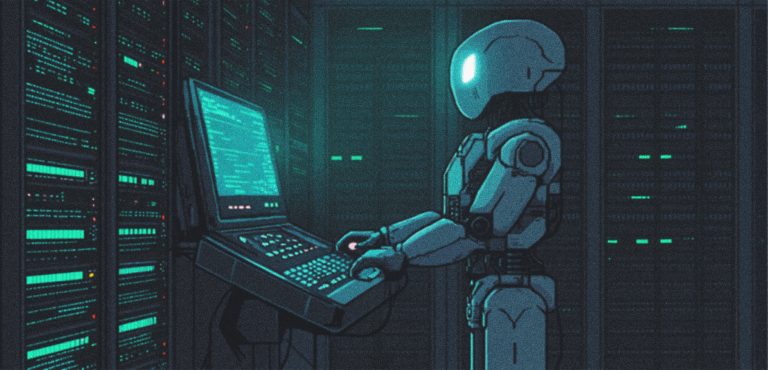
A New Era of AI in IT Operations
Integrating AI into IT operations— not surprisingly called AIOps- is at the forefront of transforming the rapidly evolving technological landscape. AIOps is revolutionising how businesses handle their IT infrastructure by utilising automation, data analytics, and machine learning to enhance IT operations.
The complexity of IT environments grows exponentially more when companies implement digital transformation strategies. The sheer volume of data produced by many applications, systems, and devices challenges traditional IT operations to maintain pace. AIOps solves this by offering solutions that automate many mundane tasks associated with IT operations, allowing teams to focus on more strategic projects.
Let’s explore how the breadth of AIOps tools, procedures, and environments automates repetitive jobs, improves system monitoring, and accelerates incident response times.
AIOps tackles repetitive task management
AIOps’ ability to automate repetitive operations is among its primary benefits. Within IT operations, these tasks could range from system configuration and maintenance to routine monitoring and alerting. IT teams traditionally relied on manual processes for these tasks, which can be time-consuming and prone to error. AIOps tools automate these tasks using algorithms to perform routine checks, generate alerts based on predefined thresholds, and even perform remedial action when needed. For example, suppose a server’s CPU utilisation surpasses a given threshold. In that case, an AIOps platform can automatically initiate scaling operations or restart the impacted services, avoiding potential downtime with no human interaction.
This automation decreases the workload for IT workers and increases productivity. Reducing the time spent on repetitive tasks allows IT experts to focus more on strategic initiatives that generate business value. Moreover, automation results in more consistency in procedures, lowering the possibility of human error during manual interventions.
Improving system monitoring
AIOps significantly enhances system monitoring capabilities through advanced analytics and machine learning algorithms. Traditional monitoring systems often rely on static thresholds and alerts, which can result in many notifications and false positives. The flood of alerts can desensitise IT staff, causing them to overlook critical issues.
AIOps enables businesses to use more complex monitoring systems that use machine learning to examine historical data and establish dynamic baselines for system performance. This enables AIOps tools to distinguish between regular fluctuations and genuine anomalies that require attention.
For instance, AI in IT operations can automatically learn an application’s typical performance patterns and detect abnormal behaviour, such as unexpected latency or errors. By filtering out noise and identifying only significant events, AIOps improves the efficiency of incident detection and helps teams prioritise their responses more effectively.
Enhancing incident response times
In today’s fast-paced digital landscape, rapid incident response is essential for ensuring business continuity while minimising downtime. AIOps automate the entire incident management process, significantly enhancing incident response times.
When an issue is identified, AIOps can automatically collect pertinent data from various sources, such as logs, metrics, and alarms, to facilitate a comprehensive understanding of the problem. This enables IT teams to diagnose problems quickly since they have instant access to the information required to resolve incidents.
Additionally, AIOps can facilitate automated workflows for incident resolution. For instance, when a specific error is detected, the system can automatically run predefined scripts or workflows to resolve the issue, such as restarting a service, reallocating resources, or applying patches. This swift, automated response significantly reduces the time needed to determine events, enabling organisations to maintain service availability and improve overall customer satisfaction.
Predictive analytics and proactive management
AIOps enables organisations to adopt a more proactive stance towards their IT operations. By leveraging predictive analytics, AI in IT operations can anticipate potential issues before they escalate into critical incidents. This is accomplished using continuous system performance monitoring and trend analysis to identify patterns that may indicate future problems.
For instance, if an application consistently shows increasing response times during peak usage hours, AIOps can notify IT teams to take proactive measures, such as optimising application performance or scaling infrastructure resources in advance. This predictive capability minimises the risk of downtime and enhances overall operational efficiency.
Additionally, AIOps can help with strategic planning and decision-making with the insights it generates. Organisations can make well-informed decisions regarding technology investments, capacity planning, and resource allocation by understanding usage patterns, resource requirements, and potential risks.
Challenges and considerations of implementing AI in IT Operations
Although AIOps have many advantages, companies must negotiate several challenges when implementing these solutions. One of the most significant issues is the necessity for high-quality data. AIOps mainly depend on comprehensive and precise data to generate insightful analysis. Therefore, organisations must ensure their data collection processes are robust and that data from several sources are effectively integrated. Another factor is the possible resistance from IT teams. The introduction of artificial intelligence and automation can create apprehension about job loss.
While highlighting that AIOps is intended to enhance human talents rather than replace them, businesses should concentrate on upskilling their IT staff to mitigate these concerns. Organisations can create a more efficient and empowered workforce by encouraging a culture that fosters collaboration between AI technologies and IT experts.
Distilled
AIOps is crucial to digital transformation since it lets IT teams run more strategically and effectively, enabling businesses to stay competitive in an increasingly complex landscape. AIOps is poised to be increasingly important in building a more efficient, reliable, and insightful IT future with proactive capabilities that increase operational resilience, lower downtime, and inspire innovation.